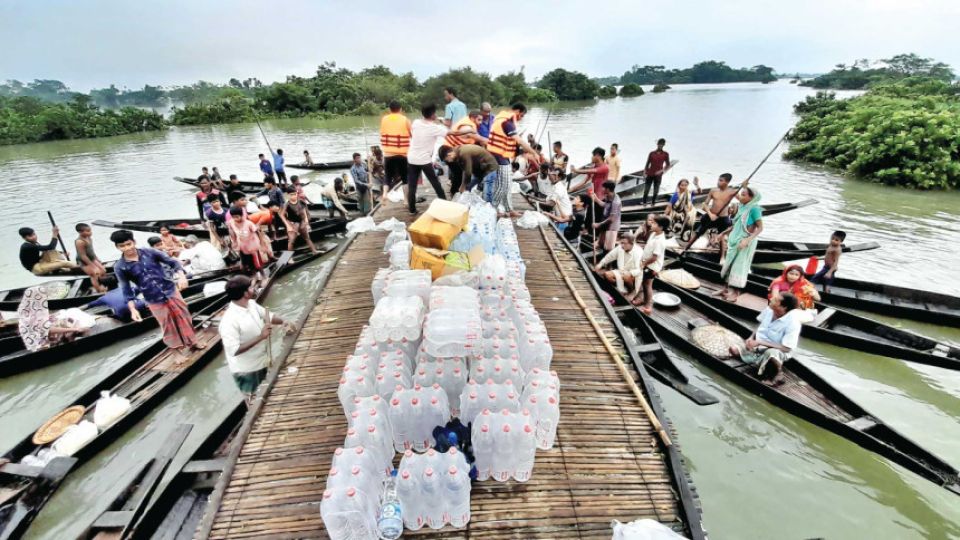June 21, 2022
DHAKA – “Sir, please note down my name. I have five daughters and we have been going hungry for two days.”
Shamsunnahar of Mrittimahal village in Sylhet’s Gowainghat upazila spoke this pleading words to a correspondent of this newspaper yesterday, in the hope that getting her name on record will somehow conjure some relief materials.
Mrittimahal and many other villages on the bank of Chengerkhal river — a tributary of the Sarigowain — are flooded and most of their residents have taken shelter in the nearby college, schools and in Shalutikar bazar, which is situated on higher ground.
After reaching the bazar at 10:30am, the correspondent was surrounded by a crowd. They said their houses were flooded, the paddy they had stored was damaged and now they were in dire need of relief materials.
Renu Miah lost the paddy he was cultivating on 15 kathas, Kamal Uddin lost the roof of his house and Montaz Uddin’s house was destroyed.
Kuddus Miah, a freedom fighter, said, “Everyone of all nearby villages is in distress and without food or relief.”
A woman said she had seen many people come with relief, but they preferred to go to remote villages while people in the bazar stayed hungry for days.
While visiting Boithakhali, Toakul, Laksminagar, Newarkandi, Chailtabari and several other villages in the upazila, the correspondent witnessed a desperate need for relief.
The correspondent also found that a lack of coordination among government and private relief distributors was prolonging the distress of flood-affected people.
Moreover, no intensive effort of local administration was seen in remote villages.
According to Divisional Commissioner Md Mosharrof, around 40 lakh people have been marooned in Sylhet and Sunamganj districts since last Wednesday.
As many as 3.72 lakh people have taken shelter at 1,214 flood shelters in the two districts. The administration disbursed 1,062 tonnes of rice, Tk 1.62 crore and more than 13,000 sacks of rice.
However, the relief is yet to reach many of the shelters. Even the 56 shelters in Sylhet city are yet to receive relief, said Ruhul Alam, executive engineer of Sylhet City Corporation (SCC) and in charge of the shelters.
“It’s been three days, we have not received any government relief, but locals are generously feeding us,” said Md Mostu Miah of Sylhet city’s Chhararpar area, who along with 150 others took shelter at Durgakumar Pathshala near SCC and district administration offices.
Abdul Manaf of Rangchi village in Sunamganj’s Madhyanagar upazila, said, “The local MP once came and gave us cooked food. That’s all we have received in the last three days.”
Meanwhile, the flood situation in Habiganj is getting worse as the Khowai river has suddenly started flowing above the danger level since early yesterday.
Lutfur Miah of Swajan village in the district’s Lakhai upazila said, “It’s been days since our village has been flooded and we have lost the last of our paddy reserve. We don’t know how we will survive the flood.”
Besides the government, hundreds of people and organisations have joined relief efforts. However, there seems to be no coordination initiated by the government.
Biman Talukdar, a voluntary relief worker, said, “We have been feeding hundreds of people in the shelters in Sylhet city and its suburbs. It is shocking to see that the people stranded in the city’s shelters are yet to receive relief. It’s hard to imagine how people are surviving in the remote villages.”
SCC Executive Engineer Ruhul Alam, said, “We were allotted only 500 sacks of dry food while there are 6,000 people in the shelter centres. But we are trying to bring dry food from our own funds and will be distributing those soon.”
Nazmul Islam, an organiser of Do Something Foundation, distributed relief in Gowainghat upazila yesterday.
“We tried to go to the farthest areas where no one reached before. But how could we know which village is untouched? The distribution would be smooth if there was central coordination by the administration.”
Debajit Singha, the additional divisional commissioner of Sylhet, said, “We have adequate relief to aid all flood-affected people and more relief in the pipeline. But the challenge is to get it to people in remote areas.
“As road communication snapped, mobile network collapsed and boats are scarce; with the help of all government organs, we are trying to get to everyone. We are also prioritising feeding all the people in the shelters,” he said.


